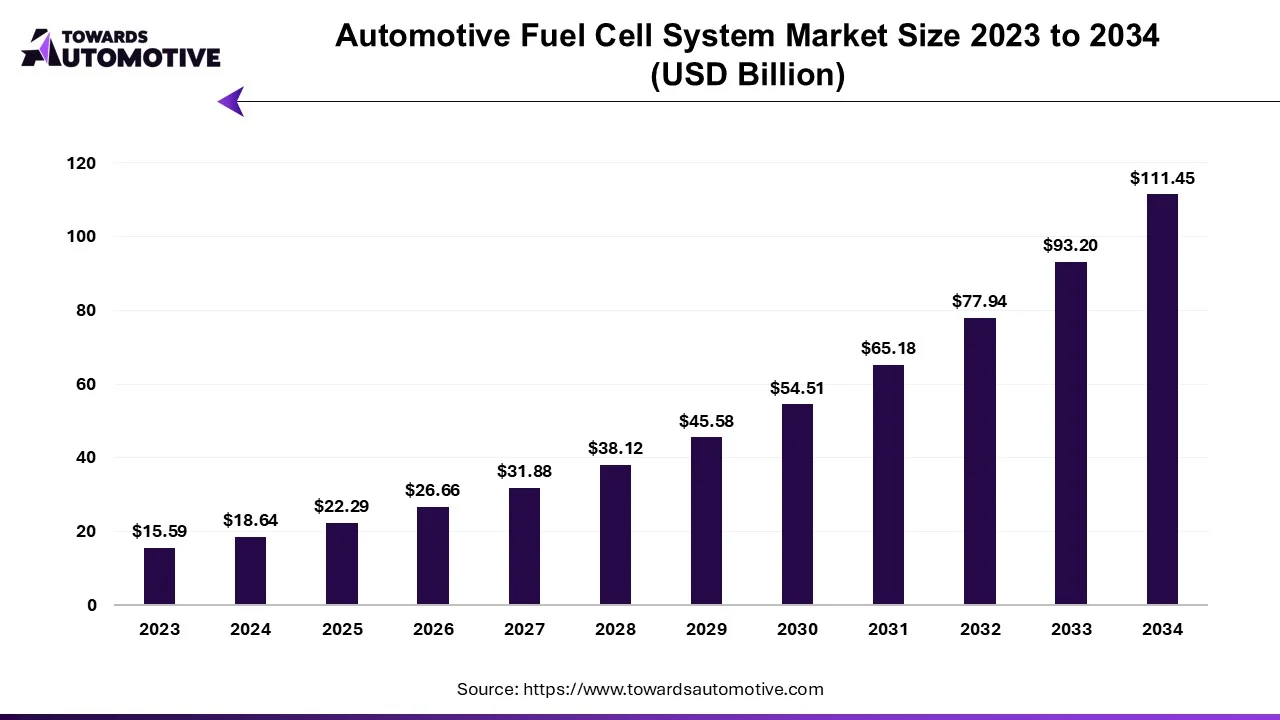In a significant move towards sustainability, BMW and Toyota announced a strategic partnership in September 2024 aimed at launching a Fuel Cell Electric Vehicle (FCEV) by 2028. This collaboration between two of the automotive industry’s giants will combine Toyota’s advanced hydrogen fuel cell technology with BMW’s engineering prowess to develop a new generation of zero-emission vehicles. The partnership is set to revolutionize the future of hydrogen-powered mobility, marking a bold step in the global shift toward cleaner transportation solutions. As the automotive industry faces increased pressure to meet stringent environmental regulations, this alliance represents a shared commitment to reducing carbon footprints and accelerating the adoption of green technologies in the automotive sector.
This move is also part of the growing momentum in the global automotive fuel cell system market, which is poised for substantial growth. The market size, calculated at USD 18.64 billion in 2024, is expected to reach USD 111.45 billion by 2034, expanding at a compound annual growth rate (CAGR) of 19.58% from 2024 to 2034. This rapid growth reflects the increasing adoption of fuel cell technologies by automakers looking to meet environmental goals and offer cleaner alternatives to traditional vehicles.

Download statistics of this report @ https://www.towardsautomotive.com/download-statistics/1015
Honda’s FCEV: The 2025 Honda CR-V with Plug-in Charging
Meanwhile, in June 2024, Honda announced an exciting addition to its lineup, the 2025 Honda CR-V, which will be equipped with a Fuel Cell Electric Vehicle (FCEV) powertrain. Designed for eco-conscious consumers, the new CR-V will feature a plug-in charging option that allows drivers to travel up to 29 miles in electric-only mode before the fuel cell system kicks in to extend the driving range. Honda’s move signals the automaker’s commitment to bringing innovative, sustainable technologies to the market, offering a versatile and environmentally friendly alternative to traditional gasoline-powered SUVs. With an increasing number of automakers embracing FCEVs, the 2025 CR-V will likely play a key role in Honda’s strategy to offer zero-emission mobility options to consumers.
As the market for fuel cell systems continues to expand, the 2025 CR-V will contribute to a growing consumer shift toward hydrogen-powered vehicles, further driving demand for hydrogen fuel cell technology.
Hyzon’s 200kW Fuel Cell System: A Leap Forward in Efficiency and Range
In March 2024, Hyzon Motors unveiled its 200kW fuel cell system, a powerful innovation that promises to make hydrogen-powered vehicles more efficient and capable. Designed to reduce the overall weight of the vehicle, this new system is expected to significantly enhance the driving range of heavy-duty hydrogen vehicles. The system’s innovative design incorporates lightweight materials and advanced engineering, making it an ideal solution for commercial vehicles looking to reduce emissions while maintaining long-distance performance. With this development, Hyzon has further solidified its position as a leader in the fuel cell technology space, helping to pave the way for more practical and cost-effective hydrogen solutions in the transportation sector.
This system aligns with the broader trends in the fuel cell market, where innovation and efficiency are key drivers. As Hyzon’s 200kW system gains traction, it will contribute to the growth of the global automotive fuel cell system market, further highlighting the increasing shift toward hydrogen-powered mobility.
Buy the ready report now @ https://www.towardsautomotive.com/price/1015
You can place an order or ask any questions, please feel free to contact us at sales@towardsautomotive.com
Explore the comprehensive statistics and insights on automotive industry data and its associated segmentation: Get a Subscription
For Latest Update Follow Us: https://www.linkedin.com/company/towards-automotive
